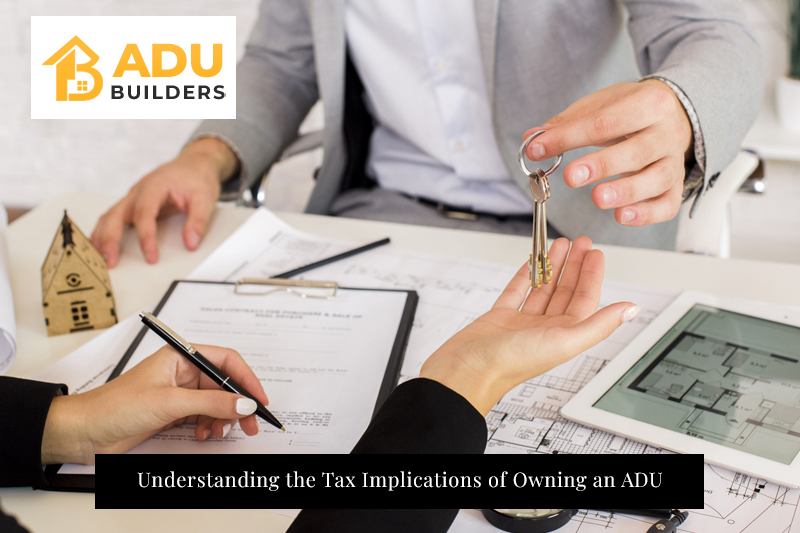In today’s time, seeing the rising prices of the house and the problem of rent, many people are thinking of building an ADU i.e. additional residential unit. ADU is an additional small house that is built on the same land with the main house. This is a smart option that can provide you with a source of additional income. This can also provide a place to live to your family members. This is a good option for elderly parents or college-going children. It also increases the value of your property.
It is very important to understand the tax rules because the income from ADU is taxable. Therefore, we should know what are the tax rules related to ADU and how to account for the income generated from it. This information will help you make better financial decisions. With the right tax planning, you can manage your income better. Following the rules will not cause any legal problems in the future. This will make your ADU investment beneficial in the long run.
Understanding the tax implications associated with owning an ADU can help you save tax legally. So let’s know in detail what are the tax rules related to ADU and how to follow them. This information will help you become a responsible ADU owner. With the knowledge of tax rules, you will be able to manage your income better. Regular tax payment will keep your reputation good. This will make it easier to get loans or other financial services in the future.

Building an ADU increases the value of your property, which changes the property tax. The cost of building the ADU and the increased property value are added to the new tax assessment. This increase affects your annual property tax bill. Some areas also have special tax exemptions for ADUs. The government encourages building additional housing. This can give you tax relief.
According to local rules, separate property tax may must be paid for ADU. In some areas, ADU is considered as a separate property. Therefore, it is assessed separately for tax. The tax rate depends on local rules. Every area has its own rules. You should be aware of the rules of your area.
It is necessary to inform the tax authorities about the construction of ADU. This information is given to the municipal corporation or local tax office of your area. Failure to give information on time may result in a fine. Keep all the necessary documents with you while giving information. This will help you get your work done quickly. Reach the office on time so that all the work is completed in one day.
After the new tax assessment, you will get a revised tax bill. It is important to pay this bill on time. Additional charges may must be paid for late payment. Take advantage of the facility of online payment. This is a safe and easy method. Timely payment will also keep your credit rating good.
It is necessary to declare the income from renting out ADU in the income tax return. This income is shown as business income or rental income. Regular income tax rates apply to this income. Calculate the income correctly. Make sure to make rent receipts. Give priority to digital payment.
Expenses related to ADU can be shown as tax deductions. These include repairs, electricity-water bills and insurance. It is important to keep a correct record of these expenses. Keep all bills and receipts on file. Keep a digital copy as well. This will be safe for you.
All documents related to rental income should be kept safe. These include rent receipts, repair bills and proof of other expenses. These documents are useful at the time of tax audit. Keep scanned copies of documents as well. Use cloud storage. Maintain old documents in a systematic manner.
Hiding income from ADU is a legal offense. This can lead to heavy fines and legal action. So declare all income correctly. Keep regular income information. Prepare monthly accounts. Keep a record of all transactions.
There are many legal tax exemptions available for ADUs. To take advantage of these exemptions, it is important to be aware of all the rules. Take the help of a good tax advisor. Review your tax planning regularly. Be aware of new tax rules.
Regularly record repair and maintenance expenses. Keep bills and receipts for these expenses. Do major repairs in a planned manner. Use quality materials. Keep photos and videos of the work. Investments made in power saving equipment can also be eligible for tax exemption. Install a solar power system. Make arrangements for rainwater harvesting. Use eco-friendly building materials. This can give you additional tax benefits.

Separate insurance is necessary for ADUs. This insurance provides protection against fire, theft and natural disasters. Insurance expenses can be shown as a tax deduction. Choose the insurance company carefully. Take a policy with good coverage. Review the insurance amount from time to time.
The expenses incurred on regular repairs and maintenance of the ADU are also important. It is important to keep track of these expenses and keep the bills safe. These expenses can also be used for tax deduction. Get the repair work done by trusted craftsmen. Use quality materials. Regular maintenance will prevent the need for major repairs.
Bills for electricity, water and other utility services are also additional expenses. These bills should be paid on time. These expenses can also be included in tax deduction. Use energy saving appliances. Adopt water saving measures. Check meter readings regularly.
It is good to make a monthly and annual budget of all expenses. This helps in financial planning and makes tax calculation easier. Divide the expenses into different categories. Review the budget every month. Control unnecessary expenses.
Owning an ADU can be a good investment but it is important to understand the tax implications associated with it. With proper tax planning, you can legally save taxes and avoid hassles. Keep all documents updated regularly and pay taxes on time. Be a responsible ADU owner and strengthen your financial position. Seek help from a tax advisor. Stay informed about new rules. Understand your rights and responsibilities.
ADUs are assessed based on their construction cost and market value. The value of the ADU added to your main property increases the total property tax. However, in many areas, the government also offers special tax exemptions to encourage ADU construction. You will must report the ADU to the local tax office.
Rental income from an ADU must be shown as rental income in income tax returns. This will form part of your total taxable income and will be subject to regular income tax rates. However, expenses related to ADU such as repairs, electricity and water bills, and insurance can be shown as tax deductions.
Yes, all expenses incurred on ADU maintenance and repairs can be shown as tax deductions. This includes regular repairs, painting, electricity and water bills, insurance premiums and other maintenance expenses. It is important to keep proper records and bills of these expenses.
Yes, it is necessary to take separate insurance for ADU which provides protection against fire, theft and natural calamities. The insurance premium can be shown as tax deduction. Ensure full coverage while choosing an insurance policy and keep the premium receipts safe.
All tax documents related to the ADU should be kept safe for at least 7 years. These include rent receipts, repair bills, insurance documents, and copies of tax returns. Keep both physical and digital copies of these documents. These documents are important at the time of tax audit.